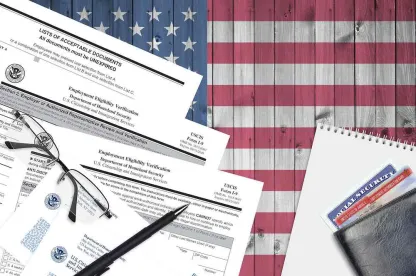On May 10, 2023, Gov. Ron DeSantis signed Senate Bill (SB) 1718, which, among other things, mandates E-Verify enrollment and participation for a considerable number of employers across Florida. See GT Alert. As this legislation takes effect July 1, this GT Alert provides answers to some commonly asked questions about SB 1718, its effect on immigration compliance for Florida employers, as well as other immigration laws in Florida with which employers must comply.
Q: What do SB 1718’s immigration compliance provisions require?
A: This law has a number of wide-reaching requirements. With respect to immigration compliance, SB 1718 mandates that employers with a workforce of 25 or more in Florida enroll and participate in E-Verify as of July 1, 2023.
Q: What is E-Verify, and how does it work?
A: E-Verify is a federal compliance program maintained by U.S. Citizenship and Immigration Services in partnership with the Social Security Administration. It provides an online portal for employee identity verification and work authorization. E-Verify must be used in conjunction with Form I-9, which employers have been required to complete for all of their employers since Nov. 6, 1986. While federal laws mandate use of E-Verify for some employers, including some federal contractors and subcontractors, many states have enacted their own laws surrounding use of E-Verify.
Q: Does the new Florida law require employers to have enrolled in E-Verify prior to July 1, 2023, and do employers have to verify their existing workforce via this program?
A: The law mandates that employers with 25 or more employees enroll in E-Verify as of July 1, 2023. Only newly hired employees can be verified through E-Verify and via completion of a new Form I-9. The new Florida law does not require employers to use E-Verify for their existing workforce, as federal law would prohibit such a requirement, with the exception of certain federal contractors and subcontractors.
Q: What penalties do employers face if they are found to have violated this new law?
A: Under SB 1718, failure to comply and utilize the E-Verify program carries considerable consequences, including potential Florida Department of Economic Opportunity fines of up to $1,000 per day until sufficient proof of correction of noncompliance is provided. The law also subjects employers who are found to hire individuals not authorized to work in the United States to additional state-imposed civil and criminal penalties, beyond the federal civil and criminal penalties also applicable in these cases. Violations can also result in revocation of any state licenses.
Q: What do employers need to do in connection with this new law?
A: Employers with a workforce of 25 or more employees in Florida who are not currently enrolled in E-Verify must enroll by July 1, 2023, and begin properly utilizing E-Verify alongside their Form I-9 practice. Employers already enrolled in E-Verify should consider conducting a self-audit of their procedures in conjunction with their immigration counsel, as state authorities are likely to conduct audits of employers’ E-Verify compliance and practices.
Q: Has Florida previously required E-Verify enrollment?
A: In 2021, the Florida legislature passed a law requiring every public employer, contractor, and subcontractor to use the E-Verify program. It was a narrower law, with SB 1718 applying more broadly to Florida employers.
Q: What other Florida laws affect immigration compliance?
A: Section 448.095(3) of the Florida Statutes requires private employers to verify the employment eligibility of new employees hired or rehired after Jan. 1, 2021. Employers must do this either via E-Verify verification or via retaining a copy of the documents required by the Form I-9 for at least three years after the employee’s initial employment date. This requirement is in contrast to federal laws, which mandate preparation of Forms I-9 for all new hires since November 1986 but do not require employers to maintain copies of the documents reviewed to complete the form to verify identity and work authorization of new hires, unless employers also are enrolled in the E-Verify program.
On Sept. 28, 2021, Gov. DeSantis issued Executive Order 21-223, requesting that the commissioner of the Florida Department of Law Enforcement, in consultation with the attorney general, conduct regular audits to ensure compliance with this law from companies doing business in the state of Florida, prioritizing employers with more than 200 employees that operate in sectors of the economy known for employing undocumented individuals.
Q: Is there an expectation of the level of enforcement of SB 1718?
A: Yes. While some of the new law’s provisions may be challenged, many are consistent with E-Verify requirements a number of other states have enacted. Furthermore, enforcement of this new law is expected to start shortly after its July 1 enactment. With the Florida Department of Law Enforcement having been conducting audits pursuant to Executive Order 21-223 for some time, the authorities have developed a procedure for conducting audits and requests for information and documents for this purpose.





 />i
/>i
